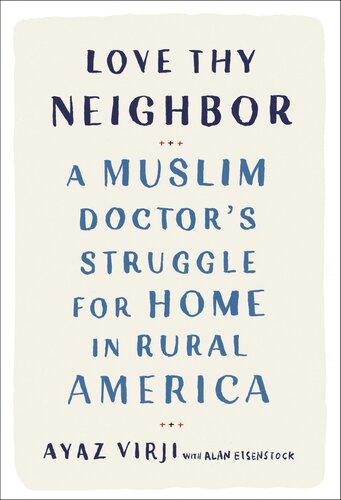
Love Thy Neighbor
A Muslim Doctor's Struggle for Home in Rural America
کتاب های مرتبط
- اطلاعات
- نقد و بررسی
- دیدگاه کاربران
نقد و بررسی

Responding to the need for doctors in rural America, Georgetown-educated physician Virji left the East Coast for small-town Minnesota in 2013 and felt welcome--until Trump's election. Then a pastor asked him to speak on Islam at her church, which led to Virji's nationwide "Love Thy Neighbor" lecture series.
Copyright 1 Library Journal, LLC Used with permission.
Starred review from April 1, 2019
Virji (The Skinny Book), a family physician and bariatric specialist practicing in Dawson, Minn., paints a harsh portrait of small-town America following the 2016 presidential elections in this clear-eyed memoir. Virji, of South Indian descent, begins with the story of moving with his family from Pennsylvania to Minnesota in 2013 to manage a hospital and open a weight loss clinic. Once there, Virji quickly makes friends and builds a successful practice. But in 2016, rural Minnesota becomes Trump country, leaving Virji with difficult questions about his place and purpose. Written in powerful vignettes that jump easily from flashback to present, the story revolves largely around a lecture Virji gave to a church, entitled “Love Thy Neighbor,” in which he attempts to answer commonly held misconceptions about Muslims. That lecture leads to more lectures, until Virji becomes an in-demand speaker in parts of rural America where Christian religious and political fervor dominate. Virji shows the community work he—and many others—are doing to combat a negative political climate through education and outreach. This is a vivid account of one man’s efforts to make sense of political tensions, racial hatred, and religious misunderstandings.

April 15, 2019
A Muslim physician details his unexpected transformation from a rural family doctor into an ambassador for cultural tolerance. In 2013, Virji left a well-paying position at a Pennsylvania hospital to practice a "dignified medicine" that treated patients as whole people rather than walking ailments. Seeking a better life and a way to redress the doctor shortage in rural America, he relocated to Dawson, Minnesota, a town of less than 1,500 residents. He and his family were the only Muslims, yet they acclimated quickly. Better still, Virji's career as the well-respected chief of staff, bariatric clinic director, and CEO of his own weight loss business blossomed: "life in every sense [was] good." The first sign of trouble appeared in 2016 when then-presidential candidate Donald Trump began to "[spew] hatred toward Muslims" in his campaign speeches. Though life in Dawson seemed unaffected by national events, everything changed after Trump won the election. Now seen as a terrorist threat, the author contemplated moving to Dubai only to realize that he did not want to be driven from the home that he and his family had come to love. Then a local pastor approached him to work on an interfaith project that aimed to dispel misconceptions about Islam among the mostly Christian members of the Dawson community. Although he believed that faith was a private matter, Virji made the task a personal jihad, or struggle. His message of tolerance struck a deep chord in Dawson as well as the other Minnesota communities where he was invited to speak. Yet his impact was constantly thwarted by rival lecturers espousing racist, anti-Muslim doctrines that tested the author's commitment to both the life he had chosen and the spirit of brotherly love he defended. Both candid and compelling, Virji's book is strong medicine for an age plagued by the ills of xenophobia, misinformation, and distrust. A courageous and necessary memoir in troubling times.
COPYRIGHT(2019) Kirkus Reviews, ALL RIGHTS RESERVED.

























دیدگاه کاربران